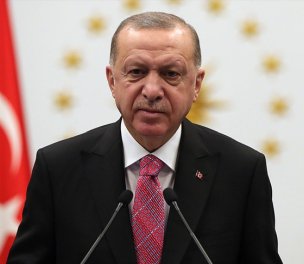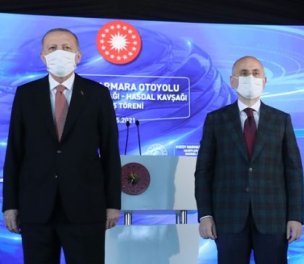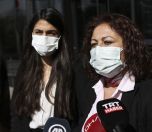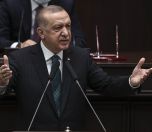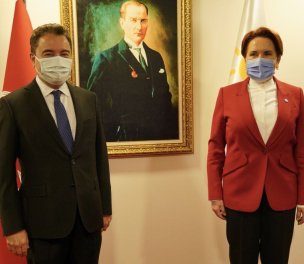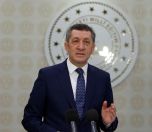* Photo: Murat Kula - AA
Click to read the article in Turkish
Ruling Justice and Development Party (AKP) Chair and President Recep Tayyip Erdoğan addressed the public following the cabinet meeting in the capital city of Ankara yesterday (February 1).
As reported by the state-run Anadolu Agency (AA), Erdoğan said, "Perhaps it is time for Turkey to discuss a new constitution again."
If the AKP reaches consensus with its partner Nationalist Movement Party (MHP) in the People's Alliance, then an "action for drafting a new constitution in upcoming period" is possible, said Erdoğan.
Underlining that the constitutional works must be done in a transparent manner, he noted that the "final text must be presented to the discretion of the nation." Erdoğan said the following about the issue:
"Maybe it is time for Turkey to discuss a new constitution again. Works to draft a constitution cannot be undertaken in clandestine venues under the shadow of terror-affiliated groups and with people mentally and spiritually disconnected from the country.
"Works in this regard must be carried out right in front of the eyes of the people and with the participation of all of the nation's representatives in a transparent manner, and the text to be produced must be submitted to the people for approval."
Most recently, the 2017 constitutional referendum asked the citizens to decide on an 18-article bill to switch from the decades-long parliamentary system to a so-called presidential government system, among other changes. Back then, the amendments to be introduced to the constitution were jointly brought by the AKP and MHP.
'Volatility in food prices will decrease'
Commenting on Turkey's economic situation amid the novel coronavirus (COVID-19) pandemic as well, AKP Chair and President Erdoğan argued that among the G20 countries, Turkey and China could register positive growth in 2020, citing international analyses.
Amid the mounting criticisms of the opposition regarding the issue, Erdoğan also stressed that the food inflation was the "greatest threat" for both producers and consumers, saying, "We believe that the volatility in food prices will decrease in the second half of the year with the developments in the world and the measures we take in our country."
He slams high interest rates, again
He said that it would be impossible to attain the country's inflation targets with high interest rates, adding that investment, production, export, and employment policies could only be done with low rates. "Let's implement necessary measures together to combat the current account deficit. Let's all remove the obstacles on a stable and quality growth," he added.
He also commented on the country's development in space and satellite technologies: "Turkey started to work on establishing a microsatellite launcher facility and will soon send its and friendly countries' satellites into space. We are determined to make our country a brand in space and satellite technologies that have a wide range of uses from communication to energy, from environmental protection to defense industry."
Village schools to open in mid-February
Amid the ongoing vaccination campaign with China-based Sinovac Biotech campany's CoronaVac vaccine, President and AKP Chair Erdoğan also announced a plan to start "gradual relaxation of the COVID-19 restrictions with the number of infections decreasing."
According to Erdoğan's statement about the issue, Turkey's schools in villages will begin face-to-face education as of February 15 and the preparations will start to resume in-class education on March 1 for 8th- and 12th-grade students, primary and special education schools.
Emphasis on 'domestic vaccines'
Regarding the COVID-19 vaccination campaign in the country, he said that the vaccination continues in line with the determined priorities.
"We closely follow domestic vaccination studies, which is one of the most crucial things in the fight against the pandemic," he said.
Turkey has divided the vaccination process in four stages.
In the first stage, health care staff and people over the age of 65, the elderly, disabled, adults living in crowded places, and those living at nursing homes will receive vaccine jabs. In the second stage, essential workers and those with at least one chronic disease will be vaccinated.
In the third stage, citizens under the age of 50 with at least one chronic disease, young adults, those working in sectors and professions which are not included in the first two stages will be vaccinated. In the fourth and last stage, all individuals other groups will be vaccinated.
The number of people who have received their first dose of a vaccine against the novel coronavirus crossed the 2 million mark as of Monday.
Turkey began a mass COVID-19 vaccination campaign on January 14, 2021 starting with healthcare workers along with top officials in a stated attempt to "encourage public confidence in the vaccines."
Since last month, Turkey has been imposing curfews on both weeknights and weekends as part of its efforts to curb the virus' spread. (EKN/SD)





